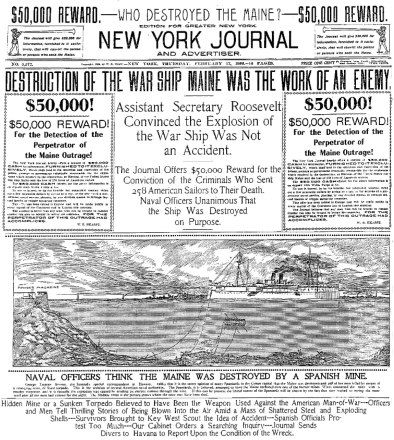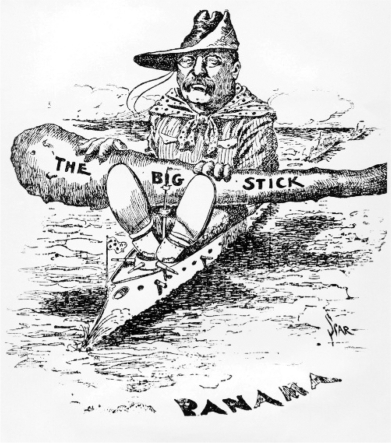Document Based Question
Compare and contrast United States foreign policy in the years between 1890 and 1924 with the country's approach to foreign policy that preceded it. To what degree and in what ways did the policy remain the same and in what ways did it change?
Document 1
Source: New York Journal, February 17, 1898.
 Document 2
Document 2
Source: The Teller Amendment, April 20, 1898.
Whereas the abhorrent conditions which have existed for more than three years in the Island of Cuba, so near our own borders, have shocked the moral sense of the people of the United States, have been a disgrace to Christian civilization, culminating, as they have, in the destruction of a United States battle ship, with two hundred and sixty-six of its officers and crew, while on a friendly visit in the harbor of Havana, and cannot longer be endured, as has been set forth by the President of the United States in his message to Congress of April eleventh, eighteen hundred and ninety-eight, upon which the action of Congress was invited: Therefore, . . .
Fourth. That the United States hereby disclaims any disposition or intention to exercise sovereignty, jurisdiction, or control over said Island except for the pacification thereof, and asserts its determination, when that is accomplished, to leave the government and control of the Island to its people.
Document 3
Source: Big Stick Diplomacy, New York Globe, 1903.
 Document 4
Document 4
Source: William Taft, Dollar Diplomacy, 1912.
The diplomacy of the present administration has sought to respond to modern ideas of commercial intercourse. This policy has been characterized as substituting dollars for bullets. It is one that appeals alike to idealistic humanitarian sentiments, to the dictates of sound policy and strategy, and to legitimate commercial aims. It is an effort frankly directed to the increase of American trade upon the axiomatic principle that the Government of the United States shall extend all proper support to every legitimate and beneficial American enterprise abroad. How great have been the results of this diplomacy, coupled with the maximum and minimum provision of the tariff law, will be seen by some consideration of the wonderful increase in the export trade of the United States. Because modern diplomacy is commercial, there has been a disposition in some quarters to attribute to it none but materialistic aims. How strikingly erroneous is such an impression may be seen from a study of the results by which the diplomacy of the United States can be judged.
Document 5
Source: Woodrow Wilson, "Appeal for Support of the League of Nations," 1919.
This is the Covenant of the League of Nations that you hear objected to, the only possible guarantee against war. I would consider myself recreant to every mother and father, every wife and sweetheart in this country, if I consented to the ending of this war without a guarantee that there would be no other. You say, "Is it an absolute guarantee " No; there is no absolute guarantee against human passion; but even if it were only 10 percent of a guarantee, would not you rather have 10 percent guarantee against war than none? If it only creates a presumption that there will not be war, would you not rather have that presumption than live under the certainty that there will be war? For, I tell you, my fellow citizens, I can predict with absolute certainty that within another generation there will be another world war if the nations of the world do not concert the method by which to prevent it.
Document 6
Source: Warren G. Harding, "Back to Normal, " Address before Home Market Club, Boston, Massachusetts, May 14, 1920.
America's present need is not heroics, but healing; not nostrums, but normalcy; not revolution, but restoration; not agitation, but adjustment; not surgery, but serenity; not the dramatic, but the dispassionate; not experiment, but equipoise; not submergence in internationality, but sustainment in triumphant nationality.
Document 7
Source: Calvin Coolidge, First Annual Message, December 6, 1923.
For us peace reigns everywhere. We desire to perpetuate it always by granting full justice to others and requiring of others full justice to ourselves.
Our country has one cardinal principle to maintain in its foreign policy. It is an American principle. It must be an American policy. We attend to our own affairs, conserve our own strength, and protect the interests of our own citizens; but we recognize thoroughly our obligation to help others, reserving to the decision of our own Judgment the time, the place, and the method. We realize the common bond of humanity. We know the inescapable law of service.
Our country has definitely refused to adopt and ratify the covenant of the League of Nations. We have not felt warranted in assuming the responsibilities which its members have assumed. I am not proposing any change in this policy; neither is the Senate. The incident, so far as we are concerned, is closed. The League exists as a foreign agency. We hope it will be helpful. But the United States sees no reason to limit its own freedom and independence of action by joining it. We shall do well to recognize this basic fact in all national affairs and govern ourselves accordingly.
Definitions:
Pilot A Survey
A preliminary study conducted to evaluate the feasibility, time, cost, risk, and adverse effects of a research project.
Internet Sampling Frames
Online lists or databases from which a researcher can select participants for a study, ensuring the sample represents a larger population.
Standard Format
A set of agreed-upon specifications or guidelines for documents, data, or processes to ensure consistency and compatibility across different platforms or scenarios.
Representative Samples
A subset of a population that accurately reflects the members of the entire population in terms of critical variables.
Q6: How did wartime experiences change Mexican-American life
Q19: From the perspective of the freedmen, what
Q25: Which statement about the Spanish-American War is
Q36: In response to the Russian Revolution that
Q36: Which of the following statements is NOT
Q42: Which statement about the People's Party is
Q49: The southern Black Codes:<br>A) allowed the arrest
Q50: Which two political figures agreed to keep
Q63: During Reconstruction, the role of the church
Q81: Grady's ideas presented an important change in